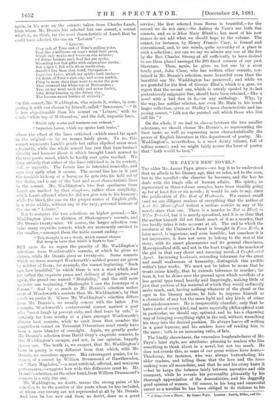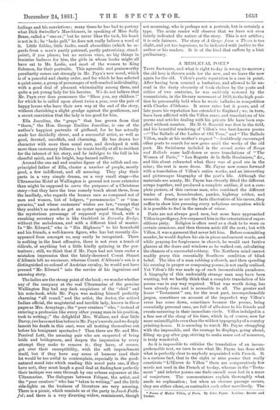MR. PAYN'S NEW NOVEL.*
THE older Mr. James Payn grows—we beg it to be understood that we allude to his literary age, that.we refer, not to the man, but to the novelist—the cheerier he becomes, and the less he deals with the tragic side of human affairs. His spirits, as represented in three-volume samples, have been steadily going up for at least five or six novels ; it would be safe to say, since the publication of The Best of Husbands. We cannot recall (and we are diligent readers of everything that the author of Lost Sir Massingbercl writes) a serious murder in any of his novels since that one. There is a murder in Not so Black as We're Painted, but it is merely episodical, and it is so clear that the author himself did not think much of it as a murder, that one hardly takes it into account at all. The end to which the emulator of the Claimant's fraud is brought in From Exile, a later novel, is ingenious, and even horrible; but somehow it is not impressive, it does not seem to belong to the rest of the story, with its smart pleasantries and its general cheeriness. More episodical still, and not in the least tragic, is the murder of the girl in that very clever and amusing novel, A Confidential Agent. Increasing bonhomie, extending tolerance for the great and small weaknesses of humanity, distinguish this prolific writer's later works. We must not be taken to mean that he treats crime kindly, that he extends tolerance to murder ; far from it, but he skims over the ground upon which novelists of a less genial type tread heavily and lingeringly, making little of just that portion of his material of which they would ordinarily make much, and, having nothing whatever of the ghoul or the ogre in his literary nature, he fails to impress himself as a chronicler of any but the more light and airy kinds of crime and misdemeanour. He is irrepressibly cheerful; only that he hates cant of every kind, and more especially philosophical cant in particular, we should say, optimist, and he has a charming way of bringing everything right in the end, without wrenching his story into the desired position. He always leaves off writing in a good humour, and his readers leave off reading him in the same ; both in an increasing ratio, of late.
The kindly shrewdness, the venomless longheadeduess of Mr. Payn's later style, are attributes pleasing to readers who like something to thiuk about in a novel, but not too much. He does not overdo this, as some of our great writers have done,— Thackeray, for instance, who was always buttonholing his older readers, and telling them that the love and the love- making were all moonshine, and that he and his crony knew it —but he keeps the balance fairly between narrative and side comment, while he reveals his personality pleasantly by his thorough appreciation of the domesticities, and his doggedly good opinion of women. Of course, in his long and successful career as a novelist he has been obliged to do violence to his • A Grate from a Thorn. By James Payn. London ; Smith, Elder, and Co.
feelings and his convictions ; many times he has had to portray what Dick Swiveller's Marchioness, in speaking of Miss Sally Brass, called a " one-er ;" but he never likes the task, his heart is not in it ; he "lacks gall," he does not really believe a word of it. Little foibles, little faults, small absurdities (which he re- gards from a man's partly paternal, partly patronising, stand- point), if you please; but no serious vices, no big things in feminine badness for him, the girls in whose books might all have sat to Mr. Leslie, and most of the women to King Solomon, for their portraits. This agreeable and praiseworthy peculiarity comes out strongly in Mr. Payn's new novel, which is of a peaceful and chatty order, and for which he has selected a quiet scene, a group of personages of well-marked individuality, with a good deal of pleasant whimsicality among them, and quite a pet young lady for his heroine. We do not believe that Mr. Payn ever does pronounce the "Bless you, my children 1" for which he is called upon about twice a year, over the pair of happy lovers who have their own way at the end of the story, without cherishing a slight grudge against the gentleman, and a secret conviction that the lady is too good for him.
Ella Josceline, the " grape " that has grown from that "thorn," the Hon. George Emilius Josceline, is one of the author's happiest portraits of girlhood, for he has actually made her decidedly clever, and a successful artist, as well as good, devoted, unselfish, and charming. He has drawn her character with more than usual care, and developed it with more than customary fullness ; he trusts hardly at all to incident for the interest of his story, and he indulges to the full in his cheerful spirit, and his bright, hap-hazard raillery.
Around the one sad and sombre figure of the selfish and un- principled father of Ella, cluster a number of people, mostly good, a few indifferent, and all amusing. They play their parts in a very simple drama, on a very small stage—the Ultramarine Hotel at Wallington is ground not more extensive than might be supposed to serve the purposes of a Christmas story—but they have the true comedy touch about them, from the landlady, who regards the human race as composed not of men and women, but of lodgers, " permanencies " or " tem- poraries," and whose customers' wishes are law, "except that they couldn't so much as get an oyster opened on Sunday," to the mysterious personage of supposed royal blood, with a sneaking secretary who is like Gashford in Barnalfy Budge, without the melodrama, and with a different kind of master. In "Mr. Edward," who is "His Highness" to his household and his friends, a well-known figure, who has but recently dis- appeared from amongst us, may easily be recognised. There is nothing in the least offensive, there is not even a touch of ridicule, of anything but a little kindly quizzing in the por- traiture ; still, we think that if Mr. Payn had not been under a mistaken impression that the lately-deceased Count Stuart d'Albanie left no successor, whereas Count d'Albanie's son is a distinguished ex-colonel of Austrian cavalry, he would not have pressed "Mr. Edward" into the service of his ingenious and amusing story.
The ladies are the strong point of the book ; we wonder whether any of the company at the real Ultramarine of the genuine Wallington Bay had any dark suspicions of the "chiel" and his note-book, while Mr. Payn was making himself perfectly charming "all round," and the artist, the doctor, the retired Indian official, the magisterial and terrible lady, known in these pages as Mrs. Armytage ; the "poor creature " who, " instead of entering a profession like every other young man in his position, took to writing ;" the delightful Mrs. Wallace, and dear little Davey, (we have met him before in Mr. Payn's novels, and we deeply lament his death in this one), were all trotting themselves out before his benignant spectacles ? Then there are Mr. and Mrs. Percival Lott, the amusing pair who are suspected of being bride and bridegroom, and deepen the impression by every attempt they make to remove it; they have, of course, got over their susceptibility, with the soft impeachment itself, but if they have any sense of humour (and their lot would be too awful to contemplate, especially in the good- natured mood into which reading this novel puts one, if they have not), they must laugh a good deal at finding how perfectly their tactique was seen through by one urbane sojourner at the Ultramarine. The dialogues between Felspar, the artist, and the "poor creature" who has "taken to writing," and the little side-lights on the business of literature are very amusing. There is a picnic, which reminds us of the party in Jacob Faith- ful; and there is a very diverting widow, reminiscent, though not mourning, who is perhaps not a portrait, but is certainly a type. The acute reader will observe that we have not even faintly indicated the nature of the story. This is not artifice ; it is only fairness. The story of A Grape from a Thorn is too slight, and yet too ingenious, to be indicated with justice to the author or his readers. It is of the kind that suffers by a hint preliminary.







































 Previous page
Previous page